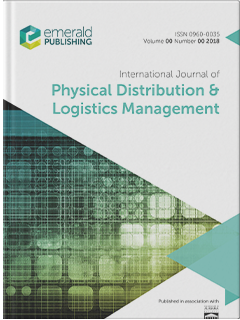
International Journal of Physical Distribution & Logistics Management
Before you start
For queries relating to the status of your paper pre decision, please contact the Editor or Journal Editorial Office. For queries post acceptance, please contact the Supplier Project Manager. These details can be found in the Editorial Team section.
Author responsibilities
Our goal is to provide you with a professional and courteous experience at each stage of the review and publication process. There are also some responsibilities that sit with you as the author. Our expectation is that you will:
- Respond swiftly to any queries during the publication process.
- Be accountable for all aspects of your work. This includes investigating and resolving any questions about accuracy or research integrity
- Treat communications between you and the journal editor as confidential until an editorial decision has been made.
- Read about our research ethics for authorship. These state that you must:
- Include anyone who has made a substantial and meaningful contribution to the submission (anyone else involved in the paper should be listed in the acknowledgements).
- Exclude anyone who hasn’t contributed to the paper, or who has chosen not to be associated with the research.
- In accordance with COPE’s position statement on AI tools, Large Language Models cannot be credited with authorship as they are incapable of conceptualising a research design without human direction and cannot be accountable for the integrity, originality, and validity of the published work. The author(s) must describe the content created or modified as well as appropriately cite the name and version of the AI tool used; any additional works drawn on by the AI tool should also be appropriately cited and referenced. Standard tools that are used to improve spelling and grammar are not included within the parameters of this guidance. The Editor and Publisher reserve the right to determine whether the use of an AI tool is permissible.
- If your article involves human participants, you must ensure you have considered whether or not you require ethical approval for your research, and include this information as part of your submission. Find out more about informed consent.
Generative AI usage key principles
- Copywriting any part of an article using a generative AI tool/LLM would not be permissible, including the generation of the abstract or the literature review, for as per Emerald’s authorship criteria, the author(s) must be responsible for the work and accountable for its accuracy, integrity, and validity.
- The generation or reporting of results using a generative AI tool/LLM is not permissible, for as per Emerald’s authorship criteria, the author(s) must be responsible for the creation and interpretation of their work and accountable for its accuracy, integrity, and validity.
- The in-text reporting of statistics using a generative AI tool/LLM is not permissible due to concerns over the authenticity, integrity, and validity of the data produced, although the use of such a tool to aid in the analysis of the work would be permissible.
- Copy-editing an article using a generative AI tool/LLM in order to improve its language and readability would be permissible as this mirrors standard tools already employed to improve spelling and grammar, and uses existing author-created material, rather than generating wholly new content, while the author(s) remains responsible for the original work.
- The submission and publication of images created by AI tools or large-scale generative models is not permitted.
Research and publishing ethics
Our editors and employees work hard to ensure the content we publish is ethically sound. To help us achieve that goal, we closely follow the advice laid out in the guidelines and flowcharts on the COPE (Committee on Publication Ethics) website.
We have also developed our research and publishing ethics guidelines. If you haven’t already read these, we urge you to do so – they will help you avoid the most common publishing ethics issues.
A few key points:
- Any manuscript you submit to this journal should be original. That means it should not have been published before in its current, or similar, form. Exceptions to this rule are outlined in our pre-print and conference paper policies. If any substantial element of your paper has been previously published, you need to declare this to the journal editor upon submission. Please note, the journal editor may use Crossref Similarity Check to check on the originality of submissions received. This service compares submissions against a database of 49 million works from 800 scholarly publishers.
- Your work should not have been submitted elsewhere and should not be under consideration by any other publication.
- If you have a conflict of interest, you must declare it upon submission; this allows the editor to decide how they would like to proceed. Read about conflict of interest in our research and publishing ethics guidelines.
- By submitting your work to Emerald, you are guaranteeing that the work is not in infringement of any existing copyright.
Third party copyright permissions
Prior to article submission, you need to ensure you’ve applied for, and received, written permission to use any material in your manuscript that has been created by a third party. Please note, we are unable to publish any article that still has permissions pending. The rights we require are:
- Non-exclusive rights to reproduce the material in the article or book chapter.
- Print and electronic rights.
- Worldwide English-language rights.
- To use the material for the life of the work. That means there should be no time restrictions on its re-use e.g. a one-year licence.
We are a member of the International Association of Scientific, Technical, and Medical Publishers (STM) and participate in the STM permissions guidelines, a reciprocal free exchange of material with other STM publishers. In some cases, this may mean that you don’t need permission to re-use content. If so, please highlight this at the submission stage.
Please take a few moments to read our guide to publishing permissions to ensure you have met all the requirements, so that we can process your submission without delay.
Open access submissions and information
All our journals currently offer two open access (OA) publishing paths; gold open access and green open access.
If you would like to, or are required to, make the branded publisher PDF (also known as the version of record) freely available immediately upon publication,you can select the gold open access route once your paper is accepted.
If you’ve chosen to publish gold open access, this is the point you will be asked to pay the APC (article processing charge). This varies per journal and can be found on our APC price list or on the editorial system at the point of submission. Your article will be published with a Creative Commons CC BY 4.0 user licence, which outlines how readers can reuse your work.
Alternatively, if you would like to, or are required to, publish open access but your funding doesn’t cover the cost of the APC, you can choose the green open access, or self-archiving, route. As soon as your article is published, you can make the author accepted manuscript (the version accepted for publication) openly available, free from payment and embargo periods.
You can find out more about our open access routes, our APCs and waivers and read our FAQs on our open research page.
Transparency and Openness Promotion (TOP) Guidelines
We are a signatory of the Transparency and Openness Promotion (TOP) Guidelines, a framework that supports the reproducibility of research through the adoption of transparent research practices. That means we encourage you to:
- Cite and fully reference all data, program code, and other methods in your article.
- Include persistent identifiers, such as a Digital Object Identifier (DOI), in references for datasets and program codes. Persistent identifiers ensure future access to unique published digital objects, such as a piece of text or datasets. Persistent identifiers are assigned to datasets by digital archives, such as institutional repositories and partners in the Data Preservation Alliance for the Social Sciences (Data-PASS).
- Follow appropriate international and national procedures with respect to data protection, rights to privacy and other ethical considerations, whenever you cite data. For further guidance please refer to our research and publishing ethics guidelines. For an example on how to cite datasets, please refer to the references section below.
Prepare your submission
Manuscript support services
We are pleased to partner with Editage, a platform that connects you with relevant experts in language support, translation, editing, visuals, consulting, and more. After you’ve agreed a fee, they will work with you to enhance your manuscript and get it submission-ready.
This is an optional service for authors who feel they need a little extra support. It does not guarantee your work will be accepted for review or publication.
Manuscript requirements
Before you submit your manuscript, it’s important you read and follow the guidelines below. You will also find some useful tips in our structure your journal submission how-to guide.
|
Format |
Article files should be provided in Microsoft Word format While you are welcome to submit a PDF of the document alongside the Word file, PDFs alone are not acceptable. LaTeX files can also be used but only if an accompanying PDF document is provided. Acceptable figure file types are listed further below. |
|
Article length / word count |
Articles should be up to a maximum of 10000 words in length. This includes all text, for example, the structured abstract, references, all text in tables, and figures and appendices. Please allow 280 words for each figure or table. Innovators and Transformers section papers should be 4,000 to 6,000 words (including structured abstract, figures & tables (fixed 280 words for each), references and appendices) that detail emerging challenges, lessons, and major innovations and transformations in the logistics and supply chain management. Submissions should: 1) inform innovation and transformation; 2) create scholarly and wider societal impact; 3) inform future meaningful research; 4) inspire future leaders in the field |
|
Article title |
A concisely worded title should be provided. |
|
Author details |
The names of all contributing authors should be added to the ScholarOne submission; please list them in the order in which you’d like them to be published. Each contributing author will need their own ScholarOne author account, from which we will extract the following details:
In multi-authored papers, it’s important that ALL authors that have made a significant contribution to the paper are listed. Those who have provided support but have not contributed to the research should be featured in an acknowledgements section. You should never include people who have not contributed to the paper or who don’t want to be associated with the research. Read about our research ethics for authorship. |
|
Biographies and acknowledgements |
If you want to include these items, save them in a separate Microsoft Word document and upload the file with your submission. Where they are included, a brief professional biography of not more than 100 words should be supplied for each named author. |
|
Research funding |
Your article must reference all sources of external research funding in the acknowledgements section. You should describe the role of the funder or financial sponsor in the entire research process, from study design to submission. |
|
Structured abstract |
All submissions must include a structured abstract, following the format outlined below. These four sub-headings and their accompanying explanations must always be included:
The following three sub-headings are optional and can be included, if applicable:
The maximum length of your abstract should be 250 words in total, including keywords and article classification (see the sections below). |
|
Keywords |
Your submission should include up to 12 appropriate and short keywords that capture the principal topics of the paper. Our Creating an SEO-friendly manuscript how to guide contains some practical guidance on choosing search-engine friendly keywords. Please note, while we will always try to use the keywords you’ve suggested, the in-house editorial team may replace some of them with matching terms to ensure consistency across publications and improve your article’s visibility. |
|
Article classification |
During the submission process, you will be asked to select a type for your paper; the options are listed below. If you don’t see an exact match, please choose the best fit:
You will also be asked to select a category for your paper. The options for this are listed below. If you don’t see an exact match, please choose the best fit: Research paper. Reports on any type of research undertaken by the author(s), including:
Viewpoint. Covers any paper where content is dependent on the author's opinion and interpretation. This includes journalistic and magazine-style pieces. Technical paper. Describes and evaluates technical products, processes or services. Conceptual paper. Focuses on developing hypotheses and is usually discursive. Covers philosophical discussions and comparative studies of other authors’ work and thinking. Case study. Describes actual interventions or experiences within organizations. It can be subjective and doesn’t generally report on research. Also covers a description of a legal case or a hypothetical case study used as a teaching exercise. Literature review. This category should only be used if the main purpose of the paper is to annotate and/or critique the literature in a particular field. It could be a selective bibliography providing advice on information sources, or the paper may aim to cover the main contributors to the development of a topic and explore their different views. General review. Provides an overview or historical examination of some concept, technique or phenomenon. Papers are likely to be more descriptive or instructional (‘how to’ papers) than discursive. |
|
Headings |
Headings must be concise, with a clear indication of the required hierarchy. |
|
Notes/endnotes |
Notes or endnotes should only be used if absolutely necessary. They should be identified in the text by consecutive numbers enclosed in square brackets. These numbers should then be listed, and explained, at the end of the article. |
|
Figures |
All figures (charts, diagrams, line drawings, webpages/screenshots, and photographic images) should be submitted electronically. Both colour and black and white files are accepted.
|
|
Tables |
Tables should be typed and submitted in a separate file to the main body of the article. The position of each table should be clearly labelled in the main body of the article with corresponding labels clearly shown in the table file. Tables should be numbered consecutively in Roman numerals (e.g. I, II, etc.). Give each table a brief title. Ensure that any superscripts or asterisks are shown next to the relevant items and have explanations displayed as footnotes to the table, figure or plate. |
|
Supplementary files |
Where tables, figures, appendices, and other additional content are supplementary to the article but not critical to the reader’s understanding of it, you can choose to host these supplementary files alongside your article on Insight, Emerald’s content hosting platform, or on an institutional or personal repository. All supplementary material must be submitted prior to acceptance. If you choose to host your supplementary files on Insight, you must submit these as separate files alongside your article. Files should be clearly labelled in such a way that makes it clear they are supplementary; Emerald recommends that the file name is descriptive and that it follows the format ‘Supplementary_material_appendix_1’ or ‘Supplementary tables’. All supplementary material must be mentioned at the appropriate moment in the main text of the article, there is no need to include the content of the file but only the file name. A link to the supplementary material will be added to the article during production, and the material will be made available alongside the main text of the article at the point of EarlyCite publication. Please note that Emerald will not make any changes to the material; it will not be copyedited, typeset, and authors will not receive proofs. Emerald therefore strongly recommends that you style all supplementary material ahead of acceptance of the article. Emerald Insight can host the following file types and extensions:
If you choose to use an institutional or personal repository, you should ensure that the supplementary material is hosted on the repository ahead of submission, and then include a link only to the repository within the article. It is the responsibility of the submitting author to ensure that the material is free to access and that it remains permanently available. Please note that extensive supplementary material may be subject to peer review; this is at the discretion of the journal Editor and dependent on the content of the material (for example, whether including it would support the reviewer making a decision on the article during the peer review process). |
|
References |
All references in your manuscript must be formatted using one of the recognised Harvard styles. You are welcome to use the Harvard style Emerald has adopted – we’ve provided a detailed guide below. Want to use a different Harvard style? That’s fine, our typesetters will make any necessary changes to your manuscript if it is accepted. Please ensure you check all your citations for completeness, accuracy and consistency. Emerald’s Harvard referencing style References to other publications in your text should be written as follows:
A few other style points. These apply to both the main body of text and your final list of references.
At the end of your paper, please supply a reference list in alphabetical order using the style guidelines below. Where a DOI is available, this should be included at the end of the reference. |
|
For books |
Surname, initials (year), title of book, publisher, place of publication. e.g. Harrow, R. (2005), No Place to Hide, Simon & Schuster, New York, NY. |
|
For book chapters |
Surname, initials (year), "chapter title", editor's surname, initials (Ed.), title of book, publisher, place of publication, page numbers. e.g. Calabrese, F.A. (2005), "The early pathways: theory to practice – a continuum", Stankosky, M. (Ed.), Creating the Discipline of Knowledge Management, Elsevier, New York, NY, pp.15-20. |
|
For journals |
Surname, initials (year), "title of article", journal name, volume issue, page numbers. e.g. Capizzi, M.T. and Ferguson, R. (2005), "Loyalty trends for the twenty-first century", Journal of Consumer Marketing, Vol. 22 No. 2, pp.72-80. |
|
For published |
Surname, initials (year of publication), "title of paper", in editor’s surname, initials (Ed.), title of published proceeding which may include place and date(s) held, publisher, place of publication, page numbers. e.g. Wilde, S. and Cox, C. (2008), “Principal factors contributing to the competitiveness of tourism destinations at varying stages of development”, in Richardson, S., Fredline, L., Patiar A., & Ternel, M. (Ed.s), CAUTHE 2008: Where the 'bloody hell' are we?, Griffith University, Gold Coast, Qld, pp.115-118. |
|
For unpublished |
Surname, initials (year), "title of paper", paper presented at [name of conference], [date of conference], [place of conference], available at: URL if freely available on the internet (accessed date). e.g. Aumueller, D. (2005), "Semantic authoring and retrieval within a wiki", paper presented at the European Semantic Web Conference (ESWC), 29 May-1 June, Heraklion, Crete, available at: http://dbs.uni-leipzig.de/file/aumueller05wiksar.pdf (accessed 20 February 2007). |
|
For working papers |
Surname, initials (year), "title of article", working paper [number if available], institution or organization, place of organization, date. e.g. Moizer, P. (2003), "How published academic research can inform policy decisions: the case of mandatory rotation of audit appointments", working paper, Leeds University Business School, University of Leeds, Leeds, 28 March. |
|
For encyclopaedia entries |
Title of encyclopaedia (year), "title of entry", volume, edition, title of encyclopaedia, publisher, place of publication, page numbers. e.g. Encyclopaedia Britannica (1926), "Psychology of culture contact", Vol. 1, 13th ed., Encyclopaedia Britannica, London and New York, NY, pp.765-771. (for authored entries, please refer to book chapter guidelines above) |
|
For newspaper |
Surname, initials (year), "article title", newspaper, date, page numbers. e.g. Smith, A. (2008), "Money for old rope", Daily News, 21 January, pp.1, 3-4. |
|
For newspaper |
Newspaper (year), "article title", date, page numbers. e.g. Daily News (2008), "Small change", 2 February, p.7. |
|
For archival or other unpublished sources |
Surname, initials (year), "title of document", unpublished manuscript, collection name, inventory record, name of archive, location of archive. e.g. Litman, S. (1902), "Mechanism & Technique of Commerce", unpublished manuscript, Simon Litman Papers, Record series 9/5/29 Box 3, University of Illinois Archives, Urbana-Champaign, IL. |
|
For electronic sources |
If available online, the full URL should be supplied at the end of the reference, as well as the date that the resource was accessed. Surname, initials (year), “title of electronic source”, available at: persistent URL (accessed date month year). e.g. Weida, S. and Stolley, K. (2013), “Developing strong thesis statements”, available at: https://owl.english.purdue.edu/owl/resource/588/1/ (accessed 20 June 2018) Standalone URLs, i.e. those without an author or date, should be included either inside parentheses within the main text, or preferably set as a note (Roman numeral within square brackets within text followed by the full URL address at the end of the paper). |
|
For data |
Surname, initials (year), title of dataset, name of data repository, available at: persistent URL, (accessed date month year). e.g. Campbell, A. and Kahn, R.L. (2015), American National Election Study, 1948, ICPSR07218-v4, Inter-university Consortium for Political and Social Research (distributor), Ann Arbor, MI, available at: https://doi.org/10.3886/ICPSR07218.v4 (accessed 20 June 2018) |
Submit your manuscript
There are a number of key steps you should follow to ensure a smooth and trouble-free submission.
Double check your manuscript
Before submitting your work, it is your responsibility to check that the manuscript is complete, grammatically correct, and without spelling or typographical errors. A few other important points:
- Give the journal aims and scope a final read. Is your manuscript definitely a good fit? If it isn’t, the editor may decline it without peer review.
- Does your manuscript comply with our research and publishing ethics guidelines?
- Have you cleared any necessary publishing permissions?
- Have you followed all the formatting requirements laid out in these author guidelines?
- Does the manuscript contain any information that might help the reviewer identify you? This could compromise the anonymous peer review process. A few tips:
- If you need to refer to your own work, use wording such as ‘previous research has demonstrated’ not ‘our previous research has demonstrated’.
- If you need to refer to your own, currently unpublished work, don’t include this work in the reference list.
- Any acknowledgments or author biographies should be uploaded as separate files.
- Carry out a final check to ensure that no author names appear anywhere in the manuscript. This includes in figures or captions.
You will find a helpful submission checklist on the website Think.Check.Submit.
The submission process
All manuscripts should be submitted through our editorial system by the corresponding author.
A separate author account is required for each journal you submit to. If this is your first time submitting to this journal, please choose the Create an account or Register now option in the editorial system. If you already have an Emerald login, you are welcome to reuse the existing username and password here.
Please note, the next time you log into the system, you will be asked for your username. This will be the email address you entered when you set up your account.
Don't forget to add your ORCiD ID during the submission process. It will be embedded in your published article, along with a link to the ORCiD registry allowing others to easily match you with your work.
Don’t have one yet? It only takes a few moments to register for a free ORCiD identifier.
Visit the ScholarOne support centre for further help and guidance.
What you can expect next
You will receive an automated email from the journal editor, confirming your successful submission. It will provide you with a manuscript number, which will be used in all future correspondence about your submission. If you have any reason to suspect the confirmation email you receive might be fraudulent, please contact the journal editor in the first instance.
Manuscript transfer service
Emerald’s manuscript transfer service takes the pain out of the submission process if your manuscript doesn’t fit your initial journal choice. Our team of expert Editors from participating journals work together to identify alternative journals that better align with your research, ensuring your work finds the ideal publication home it deserves. Our dedicated team is committed to supporting authors like you in finding the right home for your research.
If a journal is participating in the manuscript transfer program, the Editor has the option to recommend your paper for transfer. If a transfer decision is made by the Editor, you will receive an email with the details of the recommended journal and the option to accept or reject the transfer. It’s always down to you as the author to decide if you’d like to accept. If you do accept, your paper and any reviewer reports will automatically be transferred to the recommended journals. Authors will then confirm resubmissions in the new journal’s ScholarOne system.
Our Manuscript Transfer Service page has more information on the process.
Post submission
Review and decision process
Each submission is checked by the editor. At this stage, they may choose to decline or unsubmit your manuscript if it doesn’t fit the journal aims and scope, or they feel the language/manuscript quality is too low.
If they think it might be suitable for the publication, they will send it to at least two independent referees for double anonymous peer review. Once these reviewers have provided their feedback, the editor may decide to accept your manuscript, request minor or major revisions, or decline your work.
While all journals work to different timescales, the goal is that the editor will inform you of their first decision within 60 days.
During this period, we will send you automated updates on the progress of your manuscript via our submission system, or you can log in to check on the current status of your paper. Each time we contact you, we will quote the manuscript number you were given at the point of submission. If you receive an email that does not match these criteria, it could be fraudulent and we recommend you email the journal editor.
If your submission is accepted
Open access
Once your paper is accepted, you will have the opportunity to indicate whether you would like to publish your paper via the gold open access route.
If you’ve chosen to publish gold open access, this is the point you will be asked to pay the APC (article processing charge). This varies per journal and can be found on our APC price list or on the editorial system at the point of submission. Your article will be published with a Creative Commons CC BY 4.0 user licence, which outlines how readers can reuse your work.
Copyright
All accepted authors are sent an email with a link to a licence form. This should be checked for accuracy, for example whether contact and affiliation details are up to date and your name is spelled correctly, and then returned to us electronically. If there is a reason why you can’t assign copyright to us, you should discuss this with your journal content editor. You will find their contact details on the editorial team section above.
Proofing and typesetting
Once we have received your completed licence form, the article will pass directly into the production process. We will carry out editorial checks, copyediting, and typesetting and then return proofs to you (if you are the corresponding author) for your review. This is your opportunity to correct any typographical errors, grammatical errors or incorrect author details. We can’t accept requests to rewrite texts at this stage.
When the page proofs are finalised, the fully typeset and proofed version of record is published online. This is referred to as the EarlyCite version. While an EarlyCite article has yet to be assigned to a volume or issue, it does have a digital object identifier (DOI) and is fully citable. It will be compiled into an issue according to the journal’s issue schedule, with papers being added by chronological date of publication.
How to share your paper
Visit our author rights page to find out how you can reuse and share your work.
To find tips on increasing the visibility of your published paper, read about how to promote your work.
Correcting inaccuracies in your published paper
Sometimes errors are made during the research, writing and publishing processes. When these issues arise, we have the option of withdrawing the paper or introducing a correction notice. Find out more about our article withdrawal and correction policies.
Need to make a change to the author list? See our frequently asked questions (FAQs) below.
Frequently asked questions
|
Is there a submission fee |
The only time we will ever ask you for money to publish in an Emerald journal is if you have chosen to publish via the gold open access route. You will be asked to pay an APC (article processing charge) once your paper has been accepted (unless it is a sponsored open access journal). At no other time will you be asked to contribute financially towards your article’s publication. If you haven’t chosen gold open access and you receive an email which appears to be from Emerald, asking you for payment to publish, please contact the journal. |
|
How can I become |
Please contact the editor for the journal, with a copy of your CV. You will find their contact details on the editorial team tab on this page. |
|
Who do I contact if I want to find out which volume and issue my accepted paper will appear in? |
Typically, papers are added to an issue according to their date of publication. If you would like to know in advance which issue your paper will appear in, please contact the content editor of the journal. You will find their contact details on the editorial team tab on this page. Once your paper has been published in an issue, you will be notified by email. |
|
Who do I contact if I have |
Please email the journal editor – you will find their contact details on the editorial team tab on this page. If you ever suspect an email you’ve received from Emerald might not be genuine, you are welcome to verify it with the content editor for the journal, whose contact details can be found on the editorial team tab on this page. Alternatively, you can email our Rights team. |
|
Is my paper suitable |
If you’ve read the aims and scope on the journal landing page and are still unsure whether your paper is suitable for the journal, please email the editor and include your paper's title and structured abstract. They will be able to advise on your manuscript’s suitability. You will find their contact details on the Editorial team tab on this page. |
|
How do I make a change to the list of authors once the manuscript has been submitted? |
Authorship and the order in which the authors are listed on the paper should be agreed prior to submission. We have a right first time policy on this and no changes can be made to the list once submitted. If you have made an error in the submission process, please email the Journal Editorial Office who will look into your request – you will find their contact details on the editorial team tab on this page. |
-
Editor-in-Chief
-
Professor
Ivan
Russo
University of Verona - Italy
[email protected]
-
Professor
Ivan
Russo
-
Senior Associate Editor
-
Frank
Adams
Mississippi State University - USA
[email protected] -
Ceren
Altuntaş Vural
Chalmers University of Technology - Sweden
[email protected] -
Lydia
Bals
University of Applied Sciences Mainz - Germany
[email protected] -
Jyotirmoyee
Bhattacharjya
University of Sydney - Australia
[email protected] -
Ilenia
Confente
University of Verona, Italy
[email protected] -
David
Dobrzykowski
University of Arkansas, Sam M. Walton College of Business - USA
[email protected] -
Christian F.
Durach
ESCP Europe Business School - Germany
[email protected] -
Robert
Frankel
University of North Florida - USA
[email protected] -
David
Gligor
University of North Texas - USA
[email protected] -
Thomas
Goldsby
University of Tennessee - USA
[email protected] -
Ismail
Gölgeci
Aarhus University - Denmark
[email protected] -
Jan
Holmström
Aalto University - Finland
[email protected] -
Baofeng
Huo
Tianjin University, China
[email protected] -
Joakim
Kembro
Lund University - Sweden
[email protected] -
Jon
Kirchoff
East Carolina University - USA
[email protected] -
Herbert
Kotzab
University of Florida - USA
[email protected] -
Mohsin
Malik
Swinburne University of Technology - Australia
[email protected] -
Richard
Oloruntoba
Curtin University - Australia
[email protected] -
Andrea
Patrucco
Florida International University, Miami - United States
[email protected] -
Simone
Peinkofer
Michigan State University - USA
[email protected] -
Adriana
Rossiter Hofer
University of Arkansas - USA
[email protected] -
Kirstin
Scholten
University of Groningen - Netherlands
[email protected] -
Alex
Scott
University of Tennessee - USA
[email protected] -
Stefan
Seuring
University of Kassel, Germany
[email protected] -
Christina W.Y.
Wong
The Hong Kong Polytechnic University - China
[email protected]
-
Frank
Adams
-
Section Editor
-
Professor
David
Loseby
Leeds University Business School - UK
[email protected] -
Professor
Chee Yew
Wong
Leeds University - UK
-
Professor
Remko
van Hoek
University of Arkansas, Sam M. Walton College of Business - USA
[email protected]
-
Professor
David
Loseby
-
Editorial Assistant
-
Dr.
Andrea
Patrucco
Florida International University, Miami - United States
-
Dr.
Andrea
Patrucco
-
Social Media Manager
-
Dr.
Matthias
Klumpp
Politecnico di Milano - Italy
-
Dr.
Matthias
Klumpp
-
Publisher
-
Catherine
McAteer
Emerald Publishing - UK
[email protected]
-
Catherine
McAteer
-
Journal Editorial Office (For queries related to pre-acceptance)
-
Poonam
Sawant
Emerald Publishing
[email protected]
-
Poonam
Sawant
-
Supplier Project Manager (For queries related to post-acceptance)
-
Suryalakshmi
Balakrishnan
Emerald Publishing
[email protected]
-
Suryalakshmi
Balakrishnan
-
Editorial Advisory Board
-
Chad W.
Autry
University of Tennessee - USA
-
John
Bell
Ph.D.
University of Tennessee at Knoxville - USA
-
Maria
Björklund
Linköping University - Sweden
-
James H.
Bookbinder
University of Waterloo - Canada
-
Michael
Bourlakis
Cranfield School of Management - UK
-
Christian
Busse
University of Oldenburg - Germany
-
Craig R.
Carter
Arizona State University - USA
-
Martin
Christopher
Cranfield School of Management - UK
-
Alexander E.
Ellinger
The University of Alabama - USA
-
Lisa M
Ellram
Miami University of Ohio - USA
-
Nathalie
Fabbe-Costes
Aix-Marseille Université - France
-
Daniel
Flint
University of Tennessee at Knoxville - USA
-
Helena
Forslund
Linnaeus University - Sweden
-
Brian
Gibson
Murdoch University - Australia
-
Thomas J
Goldsby
University of Tennessee - USA
-
Benjamin T.
Hazen
Ph.D.
Department of Operational Sciences, Air Force Institute of Technology, USA
-
Lutz
Kaufmann
WHU-Otto Beisheim School of Management - Germany
-
A Michael
Knemeyer
The Ohio State University - USA
-
Gyöngyi
Kovács
Hanken School of Economics - Finland
-
Paul
Larson
University of Manitoba - Canada
-
Alan C
McKinnon
Kühne Logistics University - Germany
-
R. Glenn
Richey,
Jr,
Auburn University - USA
-
Stefan
Seuring
University of Kassel, Germany
-
Theodore
Stank
University of Tennessee at Knoxville - USA
-
James R.
Stock,
Former Editor of IJPDLM
University of South Florida - USA
-
Rodney
Thomas
University of Arkansas - USA
-
Stephan
Wagner
Swiss Federal Institute of Technology Zurich - Switzerland
-
Carl Marcus
Wallenburg
WHU Otto Beisheim School of Management - Germany
-
Chee Yew
Wong
Leeds University - UK
-
Chad W.
Autry
-
Editorial Review Board
-
Innocent Senyo Kwasi
Acquah
University of Cape Coast - Ghana
-
John
Aloysius
University of Arkansas - USA
-
Haris
Aslam
University of Lahore - Pakistan
-
Valeria
Belvedere
Catholic University of the Sacred Heart - Italy
-
Sakun
Boon-itt
Thammasat Business School - Thailand
-
Christopher
Boone
Mississippi State University - USA
-
Michael
Bourlakis
Cranfield School of Management - UK
-
Rebekah
Brau
Brigham Young University - USA
-
Sebastian
Brockhaus
Cleveland State University - USA
-
Vincent
Castillo
Ohio State University - USA
-
Hing Kai
Chan
Nottingham University Business School China, - People's Republic of China
-
Lujie
Chen
Xi'an Jiaotong-Liverpool University - People's Republic of China
-
Alessandra
Cozzolino
Sapienza University of Rome - Italy
-
Marina
Dabić
University of Zagreb - Croatia
-
Emanuela
Delbufalo
European University of Rome - Italy
-
Navin Kumar
Dev
Dayal Bagh Educational Institute - India
-
Anne
Dohmen
Michigan State University - USA
-
Yanji
Duan
University of North Florida - USA
-
Joachim
Ehrenthal
University of St Gallen - Switzerland
-
Reham
Eltantawy
University of North Florida - USA
-
Nathalie
Fabbe-Costes
Aix-Marseille Université - France
-
Kum
Fai Yuen
Nanyang Technological University, Singapore
-
Ellie
Falcone
Texas Christain University - USA
-
Di
Fan
Hong Kong Polytechnic University - Hong Kong
-
Mengying
Feng
Chongqing Jiaotong University - People's Republic of China
-
Bente
Flygansvær
BI Norwegian Business School - Norway
-
Vipul
Garg
University of North Texas - USA
-
Barbara
Gaudenzi
University of Verona - Italy
-
Jighyasu
Gaur
Indian Institute of Management Raipur - India
-
Luca Mattia
Gelsomino
Windesheim University of Applied Sciences - The Netherlands
-
Stefan
Genchev
University of Central Oklahoma - USA
-
Markus
Gerschberger
University of Applied Sciences Upper Austria - Austria
-
Melanie
Gerschberger
University of Applied Sciences Upper Austria - Austria
-
Larry C
Giunipero
Florida State University - USA
-
Stanley
Griffis
Ph.D.
Michigan State University - USA
-
Abhay
Grover
University of Maryland - USA
-
Minhao
Gu
Tianjin University - People's Republic Of China
-
Laharish
Guntuka
Rochester Institute of Technology - USA
-
Árni
Halldórsson
Chalmers University of Technology - Sweden
-
Graham
Heaslip
Galway-Mayo Institute of Technology - Ireland
-
Daniel
Hellström
Lund University - Sweden
-
Rowan
Hilend
ESCP Business School - Germany
-
Klas
Hjort
Lund University - Sweden
-
Rafay
Ishfaq
Auburn University - USA
-
Vipul
Jain
Victoria University of Wellington - New Zealand
-
Sebastian
Jarzębowski
Kozminski University, Poland
-
Shenyang
Jiang
Tongji University - People's Republic Of China
-
Angela
Jones
Howard University - USA
-
Jacky Cheah
Jun Hwa
Universiti Putra Malaysia - Malaysia
-
Matthias
Klumpp
Politecnico di Milano - Italy
-
Sanjay
Kumar
Valparaiso University - USA
-
Priscila
Laczynski de Souza Miguel
EAESP FGV, School of Business Administration - Brazil
-
Po-Lin
Lai
Chung-Ang University - South Korea
-
Rudi
Leuschner
Rutgers University Business School - USA
-
Rudolf
Leuschner
Rutgers University - USA
-
Chunsheng
Li
Macau University of Science and Technology - People's Republic Of China
-
Stanley
Lim
Michigan State University - USA
-
Taih-Cherng
Lirn
National Taiwan Ocean University - Taiwan
-
Baolong
Liu
Shanghai Tech University - People's Republic Of China
-
Weihua
Liu
Tianjin University, China
-
Xiaohong
Liu
Central University of Finance and Economics - People's Republic of China
-
Guanyi
Lu
Florida State University - USA
-
Michael
Maloni
Kennesaw State University - USA
-
John
Mangan
Newcastle University - UK
-
Ila
Manuj
University of North Texas - USA
-
Micah
Marzolf
Iowa State University - USA
-
Nicolò
Masorgo
Miami University - USA
-
Kaliyan
Mathiyazhagan
Thiagarajar School of Management - India
-
Marco
Melacini
Politecnico di Milano - Italy
-
Saif
Mir
Lehigh University - USA
-
Tyler
Morgan
Auburn University - USA
-
Prabhjot
Mukandwal
Wayne State University - USA
-
Monique
Murfield
Miami University of Ohio - USA
-
Khakan
Najaf
Monash University - Malaysia
-
Dag
Naslund
University of North Florida - USA
-
Ethan
Nikookar
University of Wollongong - Australia
-
Suman
Niranjan
University of North Texas - USA
-
Mikael
Ohman
Hanken School of Economics - Finland
-
Henrik
Palsson
Lund University - Sweden
-
Photis
Panayides
Cyprus University of Technology - Cyprus
-
Kulwant
Pawar
University of Nottingham - UK
-
Daniel
Pellathy
University of Tennessee - USA
-
Sara
Perotti
Politecnico di Milano - Italy
-
Francesco
Pilati
University of Trento - Italy
-
Lorenzo
Prataviera
Cranfield University - UK
-
Günter
Prockl
Copenhagen Business School - Denmark
-
Peter
Ralston
Iowa State University - USA
-
Shashank
Rao
Auburn University - USA
-
Dawn
Russell
University of North Florida - USA
-
Soroosh
Saghiri
Cranfield University - UK
-
Matthew
Schwieterman
Miami University - USA
-
Arianna
Seghezzi
Politecnico di Milano - Italy
-
Iana
Shaheen
University of Arkansas - USA
-
Jinan
Shao
University of Nottingham Ningbo China - People's Republic Of China
-
Peter
Shi
Macquarie University - Australia
-
Yongyi
Shou
Zhejiang University - People's Republic of China
-
Anníbal
Sodero
Ohio State University - USA
-
Dong-Wook
Song
World Maritime University - Sweden
-
Gunnar
Stefansson
Chalmers University of Technology - Sweden
-
Rebecca
Stekelorum
ICN Business School - France
-
Hannah J.
Stolze
Wheaton College - USA
-
Martin
Svanberg
SSPA Sweden AB - Sweden
-
Ha
Ta
Florida International University - USA
-
Min
Tian
Shandong University - People's Republic Of China
-
Travis
Tokar
Texas Christian University - USA
-
Anne
Touboulic
University of Nottingham - UK
-
Shiri D.
Vivek
Eastern Michigan University - USA
-
Carl
Wallenburg
WHU - Otto Beisheim School of Management - Germany
-
Michael
Wang
Kingston University London - UK
-
Robert
Wiedmer
Arizona State University - USA
-
Yen-Chun
Wu
National Taiwan Normal University - Taiwan
-
Biao
Yang
University of Sussex - UK
-
Jin
Yao
Miami University - USA
-
Dorsaf
Zouari
Université Grenoble Alpes - France
-
Innocent Senyo Kwasi
Acquah
Citation metrics
11.2
CiteScore 2023
11.2
CiteScore 2023
Further information
CiteScore is a simple way of measuring the citation impact of sources, such as journals.
Calculating the CiteScore is based on the number of citations to documents (articles, reviews, conference papers, book chapters, and data papers) by a journal over four years, divided by the number of the same document types indexed in Scopus and published in those same four years.
For more information and methodology visit the Scopus definition
11.8
CiteScore Tracker 2024
(updated monthly)
11.8
CiteScore Tracker 2024
(updated monthly)
Further information
CiteScore is a simple way of measuring the citation impact of sources, such as journals.
CiteScore Tracker is calculated in the same way as CiteScore, but for the current year rather than previous, complete years.
The CiteScore Tracker calculation is updated every month, as a current indication of a title's performance.
For more information and methodology visit the Scopus definition
6.70
2023 Impact Factor
6.70
2023 Impact Factor
Further information
The Journal Impact Factor is published each year by Clarivate Analytics. It is a measure of the number of times an average paper in a particular journal is cited during the preceding two years.
For more information and methodology see Clarivate Analytics
8.6
5-year Impact Factor (2023)
8.6
5-year Impact Factor (2023)
Further information
A base of five years may be more appropriate for journals in certain fields because the body of citations may not be large enough to make reasonable comparisons, or it may take longer than two years to publish and distribute leading to a longer period before others cite the work.
Actual value is intentionally only displayed for the most recent year. Earlier values are available in the Journal Citation Reports from Clarivate Analytics.
Publication timeline
Time to first decision
32
days
Time to first decision
32
days
Further information
Time to first decision, expressed in days, the "first decision" occurs when the journal’s editorial team reviews the peer reviewers’ comments and recommendations. Based on this feedback, they decide whether to accept, reject, or request revisions for the manuscript.
Data is taken from submissions between 1st June 2023 and 31st May 2024
Acceptance to publication
40
days
Acceptance to publication
40
days
Further information
Acceptance to publication, expressed in days, is the average time between when the journal’s editorial team decide whether to accept, reject, or request revisions for the manuscript and the date of publication in the journal.
Data is taken from the previous 12 months (Last updated July 2024)
Acceptance rate
9
%
Acceptance rate
9
%
Further information
The acceptance rate is a measurement of how many manuscripts a journal accepts for publication compared to the total number of manuscripts submitted expressed as a percentage %
Data is taken from submissions between 1st June 2023 and 31st May 2024.
Usage
Downloads
17546
Articles
Downloads
17546
Articles
Further information
This figure is the total amount of downloads for all articles published early cite in the last 12 months
(Last updated: July 2024)
This journal is abstracted and indexed by
- Australian Business Deans' Council (ABDC) Quality Journal List
- SSCI: Social Science Citation Index
- Scopus
- Business Source Premier
- Academic OneFile
- Business Insights: Essentials
- ABI/INFORM Complete
- Research Library Complete
- Web of Science
- CSCMP Online Logistics Bibliography
- Cabell's Directory of Publishing Opportunities in Management & Marketing
- Publication Forum
- Qualis
- ESSEC Rankings of Journals in 2016
- 2016 FNEGE Journals Ranking List (France)
- VHB-JOURQUAL 3
- FMS Journal Rating Guide - B
Reviewer information
Peer review process
This journal engages in a double-anonymous peer review process, which strives to match the expertise of a reviewer with the submitted manuscript. Reviews are completed with evidence of thoughtful engagement with the manuscript, provide constructive feedback, and add value to the overall knowledge and information presented in the manuscript.
Mission
The mission of the peer review process is to achieve excellence and rigour in scholarly publications and research.
Vision
Our vision is to give voice to professionals in the subject area who contribute unique and diverse scholarly perspectives to the field.
Values
The journal values diverse perspectives from the field and reviewers who provide critical, constructive, and respectful feedback to authors. Reviewers come from a variety of organizations, careers, and backgrounds from around the world.
Ethics
All invitations to review, abstracts, manuscripts, and reviews should be kept confidential. Reviewers must not share their review or information about the review process with anyone without the agreement of the editors and authors involved, even after publication. This also applies to other reviewers’ “comments to author” which are shared with you on decision.

Resources to guide you through the review process
Discover practical tips and guidance on all aspects of peer review in our reviewers' section. See how being a reviewer could benefit your career, and discover what's involved in shaping a review.
Calls for papers
Digital service innovation: Challenges, issues and opportunities for Logistics and Supply Chain Management
International Journal of Physical Distribution & Logistics Management
Aims of special issue The present Special issue attempts to elucidate the existing, and so far, vaguely analyzed, relationship between Digital Service Innovation (DSI) and Logistics & Supply Chain Management (L&SCM), to thus un...
Beyond the Horizons of Innovation: Rethinking Logistics, Operations, and Supply Chain Management Strategies
International Journal of Physical Distribution & Logistics Management
Overview This special issue in the International Journal of Physical Distribution & Logistics Management (IJPDLM) seeks to explore innovative approaches, emerging technologies, and novel frameworks that redefine traditional paradig...
Theorizing the role of Artificial Intelligence in Supply Chain processes: unveiling managerial perspectives and strategic applications
International Journal of Physical Distribution & Logistics Management
Submit your paper here! Aim of the Special Issue This special issue contributes novelty to the literature by offering a comprehensive examinati...
Towards decent work in the era of Logistics 4.0
International Journal of Physical Distribution & Logistics Management
This special issue aims to: Enhance awareness and understanding among logistics management researchers regarding the significance of decent work amidst the advancements of Logistics 4.0 technologies; C...
Advancing the Future of Retail Operations with Cutting-Edge Technologies
International Journal of Physical Distribution & Logistics Management
Submit your paper here! Introduction The ever-evolving retail landscape is undergoing a revolutionary shift propelled by rapid technological ad...
News
Innovative and Interactive Communications at IJPDLM
Following up a distinct communication and social media strategy, IJPDLM has launched a new LinkedIn account in order to reach its specific community of logistics researchers, including readers, authors, reviewers and further partners of the journa...
IJPDLM welcomes a Social Media Manager!
International Journal of Physical Distribution and Logistics Management (IJPDLM) is pleased to welcome Matthias Klumpp to the Editorial Board as the new Social...
Call for Senior Associate Editors (SAEs) for the International Journal of Physical Distribution & Logistics Management (IJDPLM)
The International Journal of Physical Distribution & Logistics Management (IJPDLM) is planning to recruit new senior associate editors (SAEs). The term of office is three years in the first instance with an option for a further three....
Thank you to the 2022 Reviewers of International Journal of Physical Distribution & Logistics Management
The publishing and editorial teams would like to thank the following, for their invaluable service as 2022 reviewers for this journal. We are very grateful for the contributions made. With their help, the journal has been able to publish such high...
IJPDLM Call for Social Media Editor
The International Journal of Physical Distribution and Logistics Management is seeking a Social Media Editor team to develop and implement our social media strategy to increase the journal's online presence, engagement, and impact. ...
Welcome Professor Ivan Russo!
We are pleased to welcome Professor Ivan Russo as the new co-Editor-in-Chief of IJPDLM. Ivan will be working alongside current EiC Chee Yew Wong on the journal. Professor Russo is a professor of...
Provision gaps in green logistics
More than 23% of total global CO2 emissions are attributed to the logistics industry (UNFCCC, 2018), and such figures are expected to escalate due to increasing demands on transportation and warehousing practices in conjunction with growin...
News – IJPDLM appoint new senior associate editors
The International Journal of Physical Distribution & Logistics Management (IJPDLM) has appointed two new senior associate editors (SAEs). They are Professor Lydia Bals from University of Applied Sciences Mainz, Germany,...
Call for special issue proposals IJPDLM
The International Journal of Physical Distribution & Logistics Management is currently seeking special issue proposals IJPDLM strives to provide authors and the community with "best in class" service through timeliness and fairness...
New Section: Innovators and transformers - lessons, opportunities and co-creations in logistics and supply chain management
About the section The International Journal of Physical Distribution & Logistics Management has launched a new section dedicated to research articles that detail emerging problems, challenges, lessons learnt and the future potentia...
Professor Chee Yew Wong appointed new Editor-in-Chief of the International Journal of Physical Distribution and Logistics Management
Professor Chee Yew Wong from Leeds University Business School, University of Leeds (UK), was appointed as new Editor-in-Chief of the International Journal pf Physical Distribution & Logistics Management by Emerald on 1st April 2020. Professor ...
Literati awards

International Journal of Physical Distribution & Logistics Management - Literati Award Winners 2023
We are to pleased to announce our 2023 Literati Award winners. Outstanding Paper Communicating Supply Chain Sustain...

International Journal of Physical Distribution & Logistics Management - Literati Award Winners 2022
We are pleased to announce our 2022 Literati Award winners. Outstanding Paper Overcoming the collaborativ...

International Journal of Physical Distribution & Logistics Management - Literati Award Winners 2021
We are pleased to announce our 2021 Literati Award winners. Outstanding Paper Inefficacy: the tipping poi...
International Journal of Physical Distribution & Logistics Management (IJPDLM) was established in 1970.
IJPDLM is a leading research journal bridging strategic areas of supply chain management, business logistics, marketing, sustainability, global trade and development in a way that builds knowledge on solving critical production and consumption problems.
eISSN: 0960-0035

Aims and scope
International Journal of Physical Distribution & Logistics Management (IJPDLM) strives to provide authors and the community with "best in class" service through timeliness and fairness in the review process with an emphasis on inclusivity and fostering meaningful research impact. The Journal provides business practitioners, policymakers, consultants, and academics with leading-edge information and discussion of current developments in the field. It facilitates the interchange of information among stakeholders across the globe while providing a platform for new insights into problems and techniques related to all facets of supply chain management.
IJPDLM seeks strategically focused, theoretically grounded, empirical and conceptual, quantitative and qualitative original research studies in logistics, physical distribution, purchasing, operations and supply chain management, and associated strategic issues.
This means that papers published in IJPDLM need to rely on a rigorous empirical methodology with a strong theoretical basis and contributions. A clear discussion of the results' implications, generalizability, and contribution to knowledge, with a clear connection to the SCM/Logistics literature, is also essential.
IJPDLM encourages conceptual papers or literature reviews to advance theoretical concepts or theories. However, IJPDLM does not usually publish descriptive literature reviews or bibliometric analyses that focus solely on telling who or what topics are cited and describing past studies without adding any new knowledge.
Quantitatively oriented mathematical and modeling research papers are considered out of scope and not suitable for IJPDLM. However, a quantitative model can be included as a part of an empirical study, action research, or design science paper.
For a better understanding of the journal expectations and the most common reasons for rejection at IJPDLM, please consider reading the following editorial before submitting: Editorial: Navigating excellence: understanding and overcoming common causes of manuscript rejections in logistics and supply chain management research | Emerald Insight
IJPDLM has an article section named “Innovators and transformers - lessons, opportunities and co-creations in logistics and supply chain management” This section aims to gain a deeper understanding of supply chain innovation and transformation in real-world scenarios. The journal encourages both academics and practitioners to collaborate on research and co-create knowledge and innovation. For more information, please visit:
New Section: Innovators and transformers - lessons, opportunities and co-creations in logistics and supply chain management
For additional guidance, please refer to this editorial that elucidates the recent advancements in the field of Logistics and Supply Chain Management within IJPDLM while also outlining the future directions it aims to pursue.
The scope of IJPDM covers all aspects of supply chain management and includes, but is not limited to, the topics listed below.
- Social and environmental sustainability
- Business logistics
- Omni-channel and multi-channel distribution innovations
- Customer service strategy
- Public, government, and international policy
- Implementation of supply chain processes
- Information and communication technology
- Order processing and inventory management
- Sourcing and procurement
- Sustainable production and consumption
- Risk management
- Physical and cyber security
- Marketing channels
- Global development
- Personnel recruitment and training
- Collaboration and integration
- International trade
- Network complexity
- Information and knowledge management
- Legal and financial issues
- Retailing
- Organizational and human resource development
Latest articles
These are the latest articles published in this journal (Last updated: July 2024)
Top downloaded articles
These are the most downloaded articles over the last 12 months for this journal (Last updated: July 2024)
Top cited
These are the top cited articles for this journal, from the last 12 months according to Crossref (Last updated: July 2024)

This journal is aligned with our responsible management goal
We aim to champion researchers, practitioners, policymakers and organisations who share our goals of contributing to a more ethical, responsible and sustainable way of working.
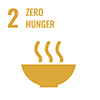




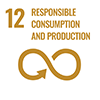

Related journals
This journal is part of our Operations, logistics & quality collection. Explore our Operations, logistics & quality subject area to find out more.
The International Journal of Logistics Management
International Journal of Logistics Management provides a platform for development and examination of management theory...
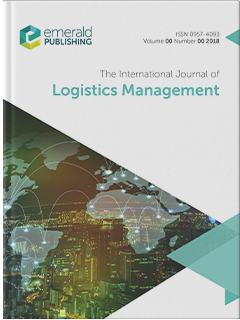
Supply Chain Management: An International Journal
Supply Chain Management pushes the boundaries of supply chain research and practice. Contributions must extend supply...
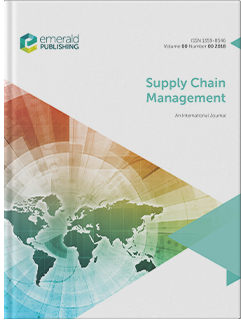
Technological Sustainability
Technological Sustainability is set to be the leading interdisciplinary journal publishing papers in the areas of...
